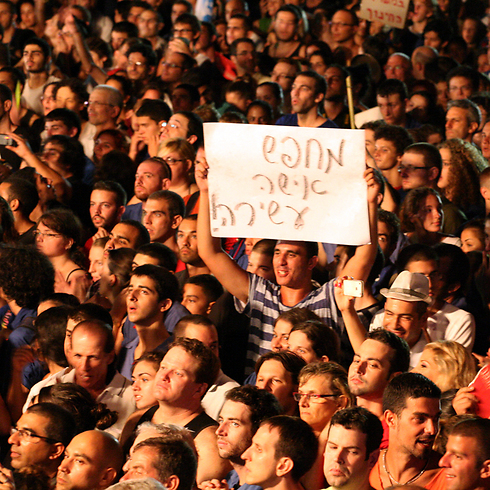Primarily because of the freedom that befell us and later because of a sense of revolution de la couch potato. There are certain ages in which everything seems possible. Just make a choice - and the world will upend itself for you. In practice, very few people make changes. Most prefer to talk about, like politicians: describe them in graphic details, get stuck on the feeling.
After graduation, came military service in South Lebanon. Ultimately, responsibility comes knocking, when you don the uniform, whether you seek it out or not. And a few days ago, on the eve of the holiday, we met in Ein Kerem, at one of the squares. After all, squares are a symbol of revolution.

When one is approaching the age of 40, they are also a symbol of routine of the kind that makes it complicated to find a free night, without children and without wife.
The other two today are principles of high schools in Jerusalem, educators even over a pint of beer. Their salaries are not high and yet here they are managing well with the cost of living. We drank, and talked a little bit about money and a lot about education and memories.
In my immediate circle, there are few who have emigrated. None of them made out that the decision to leave was ideal. The price of the Milky pudding in Berlin is an issue for them alone.
My friends and I talked about the system that it is hard for them, about the bureaucracy and the leadership figures that are lacking in Israel. They both say that there are good teachers in their schools, but the rules are bad. They are full of ideas about how to improve without turning the world upside down. Their ideal teacher teaches everything - the Bible, mathematics, and social and citizenship classes – and spends as many hours as possible with the students. The grades won't be as good when the Bible teacher teaches English, but the connection will be strong. A role model teacher.
A shot of love of country
A few weeks ago I sat on a committee at the Ministry of Education dealing with freedom of expression in schools. The committee was formed after the Adam Verta affair in Tivon. The teachers I met at his school talked about the fear of raising political issues in the classroom. They weren't alone.
This episode highlighted the power of students and social networks. The technology has brought new challenges to the classroom. Politics has brought old challenges. An angry student cans always bring a mobile phone, film part of the lesson – a sentence, a half-sentence, a quick glance - and accuse the teacher. Cause uproar at school.
I talked about the desire of parents to make sure their children have a Zionist education. It is healthy to raise question marks, but one also needs a lot of exclamation marks. I am one of those who wants my children to get a shot of love of country at school. Part of it is the understanding of Zionism and the differences between it and the Milky.
It is expensive in Israel. I don’t need persuading. With three children in kindergarten, rented apartments until two years ago, replaced by a large mortgage, my pocket certainly feels the price strain. It does not need Facebook revolutionaries from Berlin. It is hot here in the summer, there are long queues, shoddy manners and cynical politicians. The list of complaints is long and mostly justified. But it does not justify leaving the country.
The decision to live in Israel is a mix of logic and nationalist sentiment. You need a little of this and a little of that in order to live there. At the start of the last century, supporters of Zionism came from both sides. Logic led to the conclusion that the Jews have no one to trust, sentiment created a feeling of connection here. After the Kishinev pogrom, thousands of Jews in Russia became Zionists. After the Farhud riots in Baghdad, thousands of Jews in Iraq became Zionists. Ditto Western Europe.
A significant portion of this same Zionist logic is written in blood. Today, the logic of those leaving is written in the ink of the receipt at the supermarket. It is cheaper in Berlin, they've convinced me of that. There are cheap apartments, and cheap German kindergartens, even the despair is more convenient and less expensive when one does not identify with the place in which one lives. For those who do not feel uncomfortable living on that soil, life will be cheaper than in Israel. The struggle is about emotion.
The efforts to find justification for emigration, to call on thousands of young Israelis turn to Germany, is ultimately merely an attempt to be rid of it, this nagging emotion. Those without feeling do not expend so much energy trying to convince those who stayed behind to emigrate as well.
The logic varies depending on the period. The sentiment remains. This trend of engaging with expats repeats itself every few months.
Since the establishment of the state there have been those who left, and those who were angry about it. It has always been so hard here and yet so good at the same time. The role of the state is to not to give free passes - to say aloud that Zionism is in fact the establishment of a national home precisely here. It is not easy to say it to the Jews who feel Zionist enough abroad, it is not easy to say it to Israelis who explain that it is expensive here, but it's true.
Each time I write against something harsh about emigration from Israel a few more people are angry at me. Someone wrote to me recently that I was arrogant and disconnected from people's distress. An Israeli guy in Berlin told me on Facebook that he would never read me again. They are justified in their own eyes, and I am upsetting in my anachronism.
In the free world, people are allowed to migrate from place to place, and also leave Israel, even though I don’t fancy it myself. There is no reason to make it a source of pride.
Anyone who wants to protest against the cost of living should do it from the squares in Israel. Anyone who wants to lecture us should come here to do it. Those who run their campaigns remotely are merely failed revolutionaries.

















